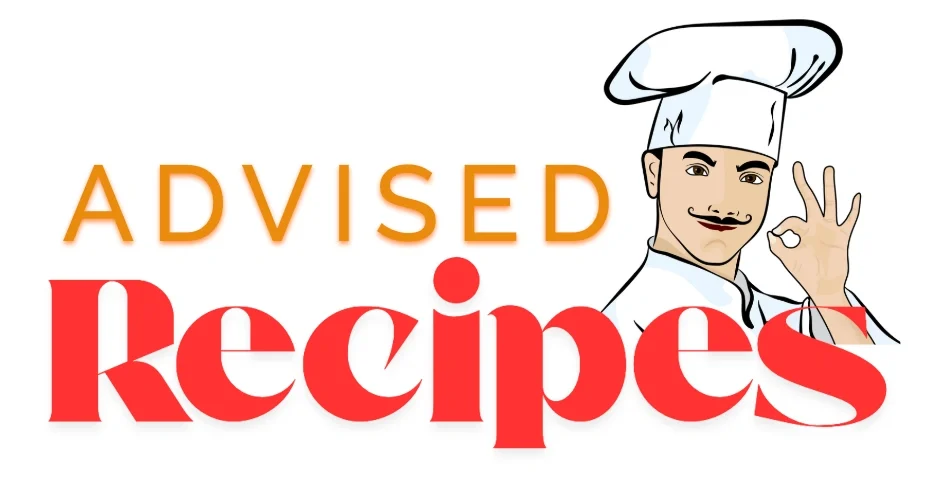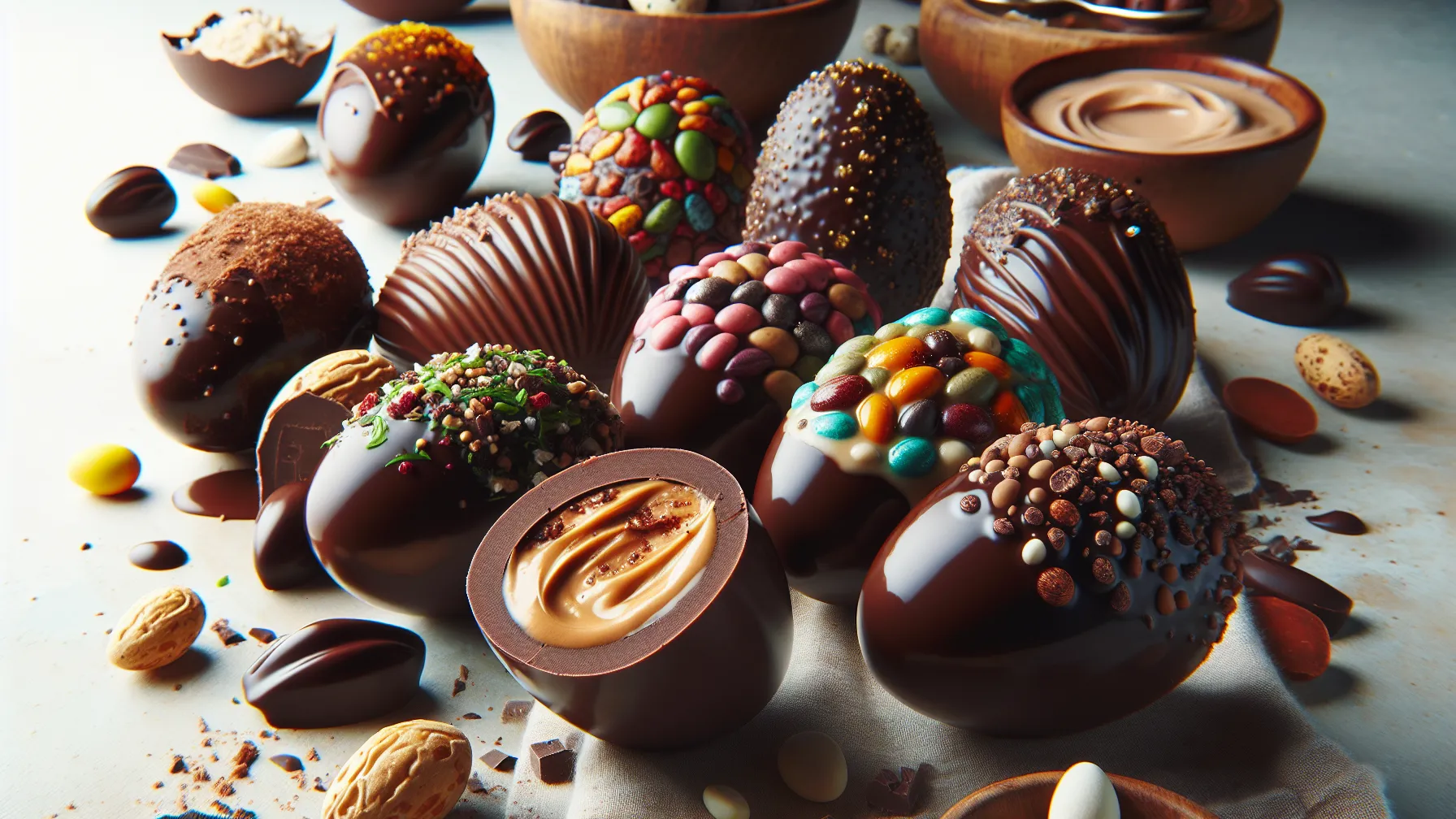Vegan chocolate covered Easter eggs are taking over spring celebrations, offering a delicious and compassionate alternative to traditional holiday sweets. These plant-based delights are not only indulgent but also align with ethical values and health-conscious lifestyles. Easter is no longer just about sugar-packed, dairy-laden chocolate treats. Thanks to growing awareness and demand, vegan chocolate covered Easter eggs are becoming a seasonal staple in homes across the country.
Whether you’re following a vegan diet, avoiding lactose, or just aiming to reduce refined sugars, these guilt-free Easter treats have something for everyone. In this ultimate guide, we’ll walk you through everything you need to know—from simple DIY recipes and the best store-bought options to unique flavor ideas and allergen-safe versions.
Table of contents
Table of Contents
Why Choose Vegan Chocolate Covered Easter Eggs?
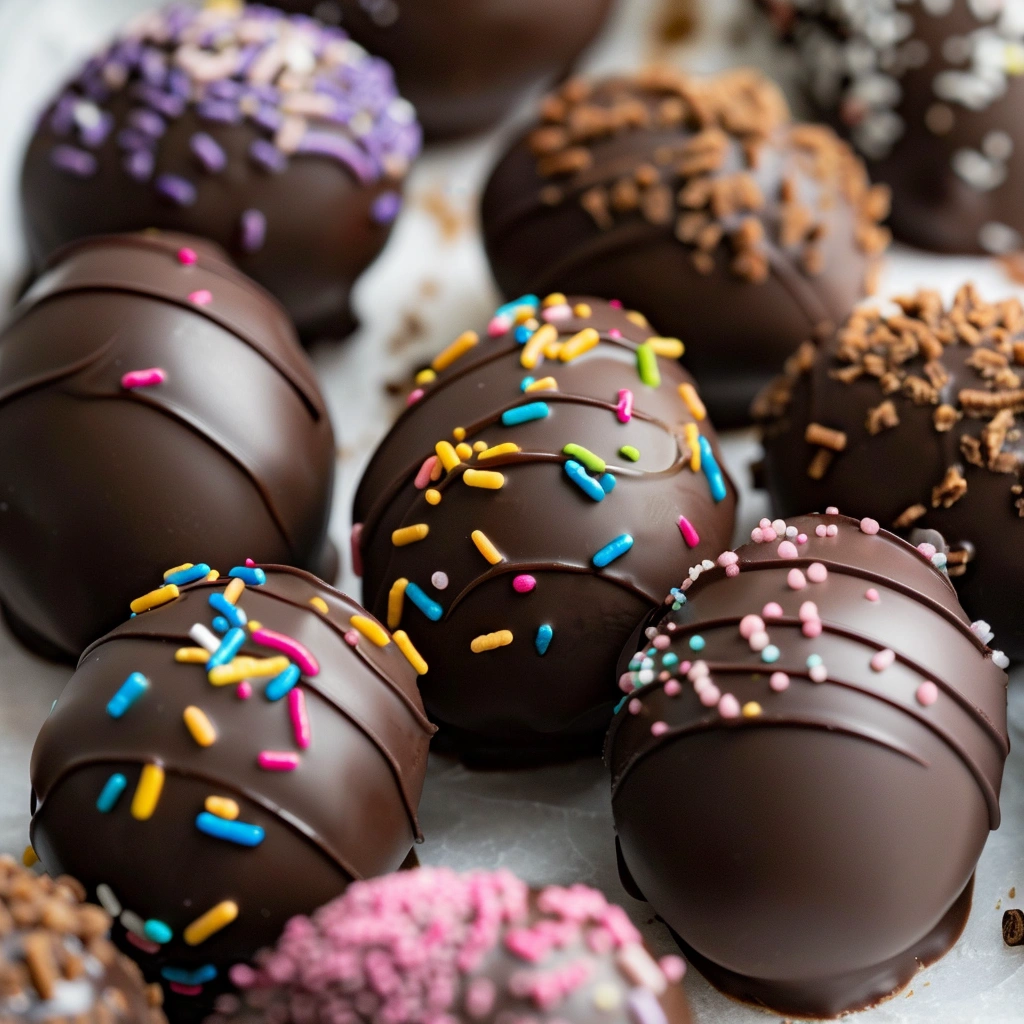
The Shift Toward Plant-Based Holidays
The way we celebrate holidays is changing. More people are choosing vegan chocolate covered Easter eggs over traditional candy for reasons that go beyond taste. Holidays used to mean indulgence without thought—lots of dairy, processed sugar, and wasteful packaging. But today, many families are embracing a more mindful approach.
Plant-based celebrations are on the rise, and Easter is getting a delicious, ethical update. By choosing vegan chocolate covered Easter eggs, you’re not just satisfying cravings—you’re taking a stand for the planet, your health, and animal welfare. These treats are proof that you don’t have to sacrifice flavor to enjoy a compassionate, healthier lifestyle.
Recent surveys show that nearly 1 in 4 Americans now look for plant-based or vegan options during holidays. This shift is inspiring home bakers and major brands alike to recreate nostalgic favorites with ethical ingredients and better-for-you formulations.
Ethical, Environmental, and Health Benefits
Choosing vegan chocolate covered Easter eggs is more than a dietary preference—it’s a lifestyle choice that benefits you and the world around you.
| Benefit Type | Vegan Chocolate Covered Easter Eggs Offer… |
|---|---|
| Ethical | No animal exploitation; no dairy, gelatin, or animal-based dyes |
| Environmental | Lower carbon emissions, less water usage, and more sustainable packaging |
| Health | Zero cholesterol, fewer additives, and free from common allergens |
Most vegan chocolate covered Easter eggs are made without refined sugars, dairy, or artificial chemicals, making them a cleaner, safer option—especially for kids and those with food sensitivities. Plus, they come in endless varieties, from nut-free to gluten-free to soy-free versions.
For more plant-based dessert ideas, try this refreshing lemon custard with strawberry compote—a light and elegant vegan treat.
What Makes a Chocolate Easter Egg Vegan?
Understanding Vegan Chocolate Ingredients
To be labeled as vegan, chocolate must be completely free of animal-derived ingredients. Traditional chocolate Easter eggs often contain milk, whey, casein, and other additives sourced from dairy. In contrast, vegan chocolate covered Easter eggs are made using plant-based alternatives that deliver the same creamy texture and rich taste—without compromise.
The base of vegan chocolate typically includes:
- Cocoa solids or cacao nibs – the main flavor source
- Cocoa butter – naturally dairy-free fat extracted from cocoa beans
- Unrefined sweeteners like coconut sugar, maple syrup, or agave
- Plant-based milk powders such as oat, rice, or almond (optional)
Premium vegan chocolates may also be organic, non-GMO, and free of emulsifiers like soy lecithin or palm oil, making them a cleaner choice overall.
Importantly, vegan chocolate covered Easter eggs can also include fillings—like nut butter, fruit puree, or coconut cream—that are carefully selected to maintain plant-based integrity.

Common Non-Vegan Additives to Avoid
When shopping or making your own vegan chocolate covered Easter eggs, it’s crucial to read labels and know what to avoid. Even chocolates labeled “dark” or “bittersweet” can include hidden animal products.
Here are common ingredients that disqualify a chocolate egg from being vegan:
| Non-Vegan Ingredient | Why It’s Not Vegan |
|---|---|
| Milk solids / milk fat | Derived from cow’s milk |
| Whey / casein | Milk proteins used in creamy confections |
| Gelatin | Comes from animal bones/tissue |
| Shellac | Resin secreted by insects for shiny coating |
| Confectioner’s glaze | Made using bug-derived resin |
| Carmine / Red 4 | A red dye made from crushed beetles |
Even ingredients like natural flavorings can sometimes be animal-based unless clearly stated otherwise. Always look for certifications such as “Certified Vegan,” “Dairy-Free,” or “Cruelty-Free” to be sure you’re choosing genuine vegan products.
Many brands have now eliminated these additives entirely, offering fully plant-based options that are both delicious and ethical.
Popular Vegan Fillings for Easter Eggs
Peanut Butter, Coconut Cream, and Date Caramel Centers
The magic of vegan chocolate covered Easter eggs doesn’t stop at the shell—it’s what’s inside that makes each bite unforgettable. Fillings are what give these treats personality, texture, and variety. Thankfully, there’s no shortage of vegan-friendly options that pack flavor without animal ingredients.
Here are some of the most beloved vegan fillings:
- Peanut Butter – A classic! Creamy, salty-sweet, and satisfying. Use natural peanut butter with no added sugar or hydrogenated oils.
- Coconut Cream – Silky and smooth with a tropical twist. Blend it with a touch of vanilla or maple syrup for richness.
- Date Caramel – Made by blending soft Medjool dates with almond butter and a pinch of sea salt. It’s naturally sweet and sticky, perfect for that chewy bite.
- Almond Butter & Cashew Butter – Nutty and mild, these work great for a more neutral flavor base.
- Vegan Marshmallow Cream – For a fluffy center that brings nostalgia to every bite.
You can also get creative by mixing in spices like cinnamon or adding textures like crisped rice or toasted coconut.
Nut-Free, Gluten-Free, and Allergen-Friendly Alternatives
Not everyone can enjoy nuts, gluten, or soy. Fortunately, there are plenty of vegan chocolate covered Easter egg options that cater to all kinds of dietary needs—making it easy to include everyone at your Easter table.
Allergen-Friendly Filling Ideas:
| Allergen Concern | Safe Vegan Alternatives |
|---|---|
| Nut allergies | Use sunflower seed butter, oat butter, or chickpea-based spreads |
| Gluten intolerance | Avoid wheat-based additives and opt for gluten-free flavorings |
| Soy-free | Choose coconut-based cream fillings and soy-free dark chocolate |
| Refined sugar-free | Sweeten fillings with dates, maple syrup, or fruit purées |
These allergy-conscious treats make vegan chocolate covered Easter eggs a go-to dessert not just for vegans, but for schools, parties, and health-focused families.
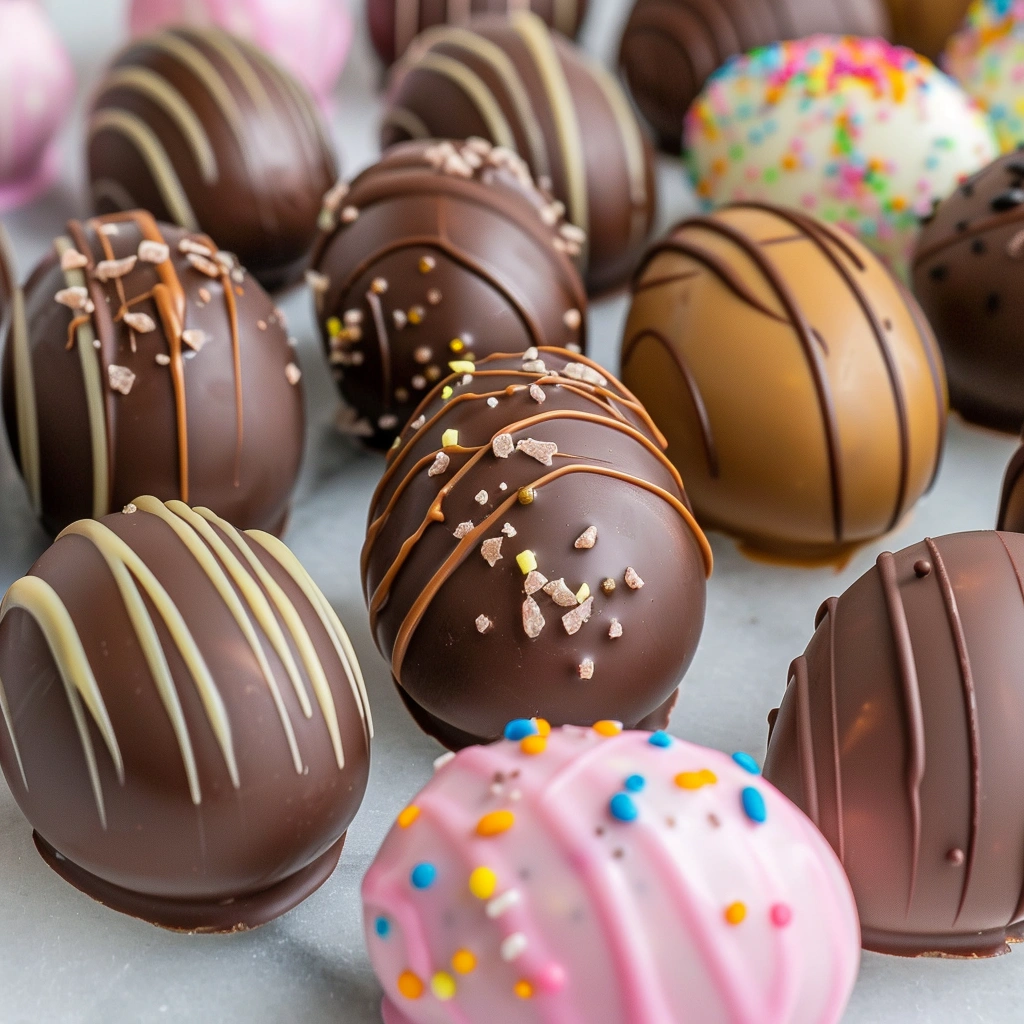
How to Make Vegan Chocolate Covered Easter Eggs at Home
Step-by-Step Recipe Using Simple Ingredients
Making your own vegan chocolate covered Easter eggs at home is easier than you think—and even more delicious than store-bought! With just a few clean ingredients and the right mold, you can whip up rich, creamy, and satisfying Easter treats that everyone will love.
Basic Ingredients:
- 1 cup dairy-free dark chocolate chips or chopped vegan chocolate bar
- ½ cup natural peanut butter or sunflower seed butter
- 2 tablespoons maple syrup or agave nectar
- 1 tablespoon coconut flour (for texture)
- 1 teaspoon vanilla extract
- Pinch of sea salt
Instructions:
- Make the filling
In a mixing bowl, combine the peanut butter, maple syrup, vanilla, salt, and coconut flour. Mix until smooth and dough-like. Set aside in the fridge for 10 minutes to firm up. - Melt the chocolate
Using a double boiler or microwave in short bursts, gently melt the vegan chocolate until smooth. Stir frequently to avoid burning. - Assemble the eggs
Spoon a small layer of chocolate into your silicone egg molds. Tilt to coat the sides evenly. Freeze for 5–10 minutes to harden. - Add the filling
Roll small amounts of filling into oval shapes and place inside each chocolate-coated mold. Cover with remaining melted chocolate. - Chill and set
Place in the freezer for 15–20 minutes until fully set. Once firm, gently pop your vegan chocolate covered Easter eggs out of the molds. - Store or decorate
Store in the fridge in an airtight container for up to 7 days. Decorate with natural sprinkles, edible glitter, or drizzle with more melted chocolate for extra flair.
Best Kitchen Tools for Molding and Coating
You don’t need professional equipment to make perfect vegan chocolate covered Easter eggs, but a few tools can make the process much easier—and more fun!
| Tool | Why You Need It |
|---|---|
| Silicone egg molds | Flexible and non-stick, ideal for shaping and removing eggs |
| Double boiler or heatproof bowl | For safe and smooth chocolate melting |
| Piping bag or spoon | Helps layer chocolate and add clean finishing touches |
| Cooling rack & parchment paper | Prevents sticking and allows even setting after coating |
| Decorating tools | For drizzling, sprinkling, or personalizing with natural dyes |
These tools make it easier to experiment with different fillings, coatings, and decorative styles—turning your kitchen into a mini chocolate workshop.
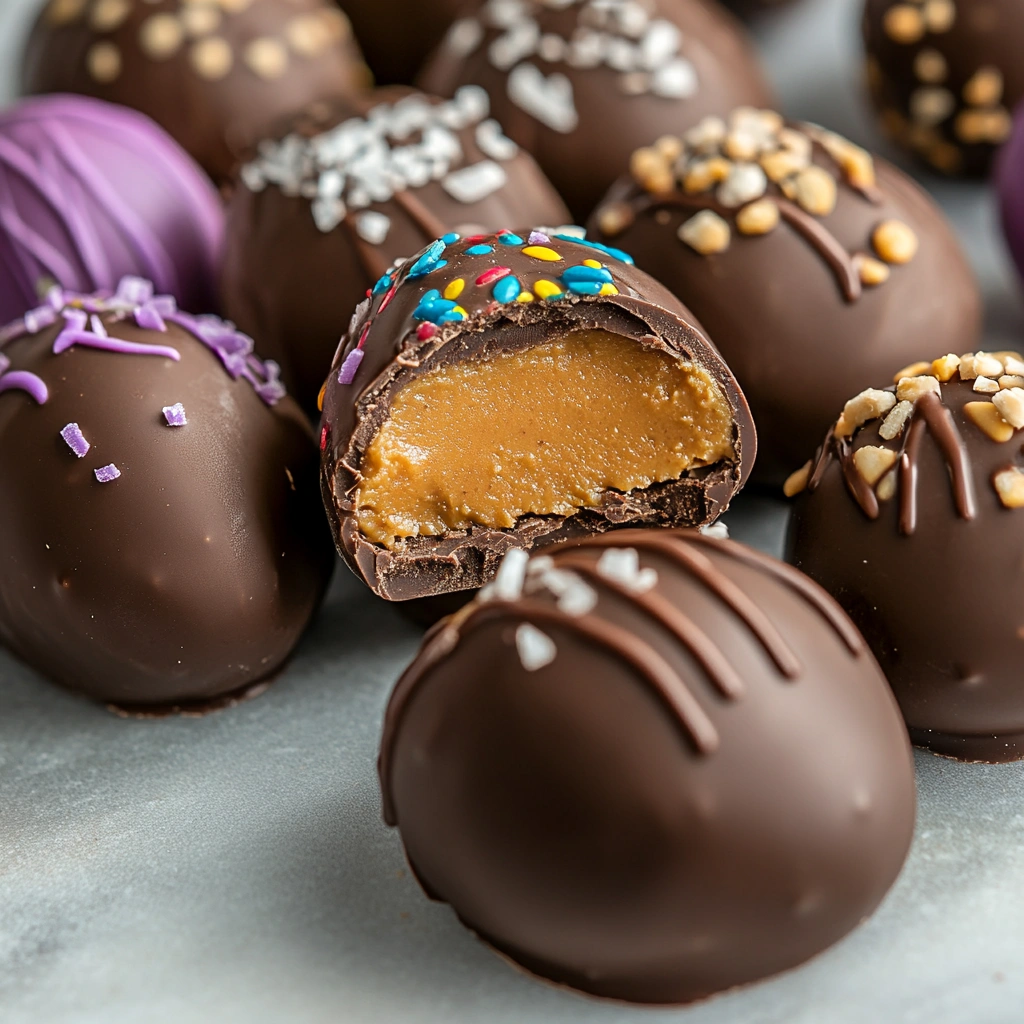
Creative Flavor Variations and Toppings
Matcha, Raspberry, Pistachio, and More
One of the best things about vegan chocolate covered Easter eggs is how easy it is to get creative with them. These delicious plant-based treats are more than just chocolate—they’re a blank canvas for flavor, texture, and color. Whether you’re making them at home or buying from an artisanal brand, there’s no shortage of variations to try.
Let’s explore some exciting flavor combinations that take vegan chocolate covered Easter eggs to the next level:
- Matcha & White Chocolate – The earthy flavor of matcha blends beautifully with vegan white chocolate. Add a little coconut cream to make it rich and creamy.
- Raspberry & Dark Chocolate – Sweet, tangy raspberry puree or freeze-dried raspberry powder adds a punch of flavor to your vegan chocolate covered Easter eggs.
- Pistachio & Cardamom – A luxurious blend for grown-up palates. This filling delivers a nutty, fragrant experience in every bite.
- Mint & Cocoa – Peppermint extract paired with dark chocolate is a holiday classic that works perfectly in these Easter creations.
- Coconut & Lime – A tropical twist made with shredded coconut and lime zest. Refreshing, sweet, and ideal for spring.
Whether you prefer fruity, nutty, or herbaceous, there’s a version of vegan chocolate covered Easter eggs to satisfy every flavor craving. You can even divide one batch into multiple fillings to give your Easter baskets a colorful variety.
For a seasonal twist, check out our pumpkin spice protein recipes—perfect inspiration for fall-themed vegan chocolate covered Easter eggs.
Natural Coloring and Edible Decorations
Color and decoration are half the fun when it comes to vegan chocolate covered Easter eggs. Unlike traditional Easter candies that rely on synthetic dyes and animal-based glazes, these vegan versions use vibrant, natural ingredients to bring your eggs to life.
Plant-Based Natural Coloring Ideas:
| Color | Natural Ingredient |
|---|---|
| Pink | Beet powder or raspberry juice |
| Green | Matcha or spirulina powder |
| Yellow | Turmeric or saffron |
| Purple | Blueberry powder |
| Blue | Butterfly pea flower |
You can mix these colorings into the chocolate coating or the filling to create beautiful, Instagram-worthy vegan chocolate covered Easter eggs without any artificial additives.
Vegan-Friendly Decoration Ideas:
- Drizzles of white or dark vegan chocolate
- Crushed freeze-dried fruit for texture and color
- Toasted coconut flakes or cacao nibs
- Vegan-friendly edible glitter made from mica or sugar-based ingredients
- Hand-piped plant-based icing or nut butter swirls
Decorating your vegan chocolate covered Easter eggs is a fun activity for both adults and kids, turning a simple snack into a personal and meaningful holiday experience.

Where to Buy the Best Vegan Easter Eggs
Top Brands and Online Stores for 2025
Not everyone has the time—or the desire—to make their own vegan chocolate covered Easter eggs. Luckily, many amazing brands offer ready-made options that are just as indulgent and completely cruelty-free. Whether you’re looking for allergen-free ingredients, organic certifications, or gourmet flavors, the market for vegan chocolate covered Easter eggs has grown significantly in recent years.
Here are some of the best places to buy vegan Easter treats in 2025:
1. Lake Champlain Chocolates
Their seasonal line includes beautifully wrapped vegan chocolate covered Easter eggs, vegan bunnies, and cruelty-free candy bars made with fair-trade dark chocolate.
2. Coracao Confections
If you’re looking for clean-label treats, Coracao offers handcrafted vegan chocolate covered Easter eggs made with organic, soy-free, and gluten-free ingredients. Their dark chocolate shells are rich and flavorful, perfect for adults with refined taste.
3. No Whey! Foods
No Whey! specializes in allergy-safe chocolate, making it one of the top brands for nut-free, dairy-free, and gluten-free vegan chocolate covered Easter eggs. Their holiday selection is designed to be kid-friendly and school-safe, making it an excellent choice for families.
4. Trupo Treats
Known for their ethical sourcing and creamy oat milk chocolate, Trupo Treats crafts unique vegan chocolate covered Easter eggs that appeal to both nostalgic candy lovers and modern plant-based eaters.
Many of these brands offer holiday bundles or limited-edition packaging, making them ideal for Easter baskets, gifts, and spring events.
How to Choose Based on Ingredients and Ethics
When buying vegan chocolate covered Easter eggs, it’s important to read labels carefully and consider both the ingredients and the brand’s ethical practices. Here’s what to look for:
| Label to Look For | What It Means |
|---|---|
| Certified Vegan | Free from animal products and byproducts |
| Fair Trade Certified | Ethically sourced cacao, supporting fair wages and sustainability |
| Organic / Non-GMO | No synthetic chemicals, additives, or genetically modified ingredients |
| Allergen-Friendly Icons | Clear labeling for nut-free, soy-free, or gluten-free varieties |
| Plastic-Free Packaging | Sustainable materials, compostable wrappers, or recyclable boxes |
It’s worth supporting brands that go the extra mile in sustainability and ethics. The best vegan chocolate covered Easter eggs don’t just taste great—they also reflect conscious consumer values.
If you’re in the U.S., most of the top brands listed offer nationwide shipping and often launch early-bird discounts in March.
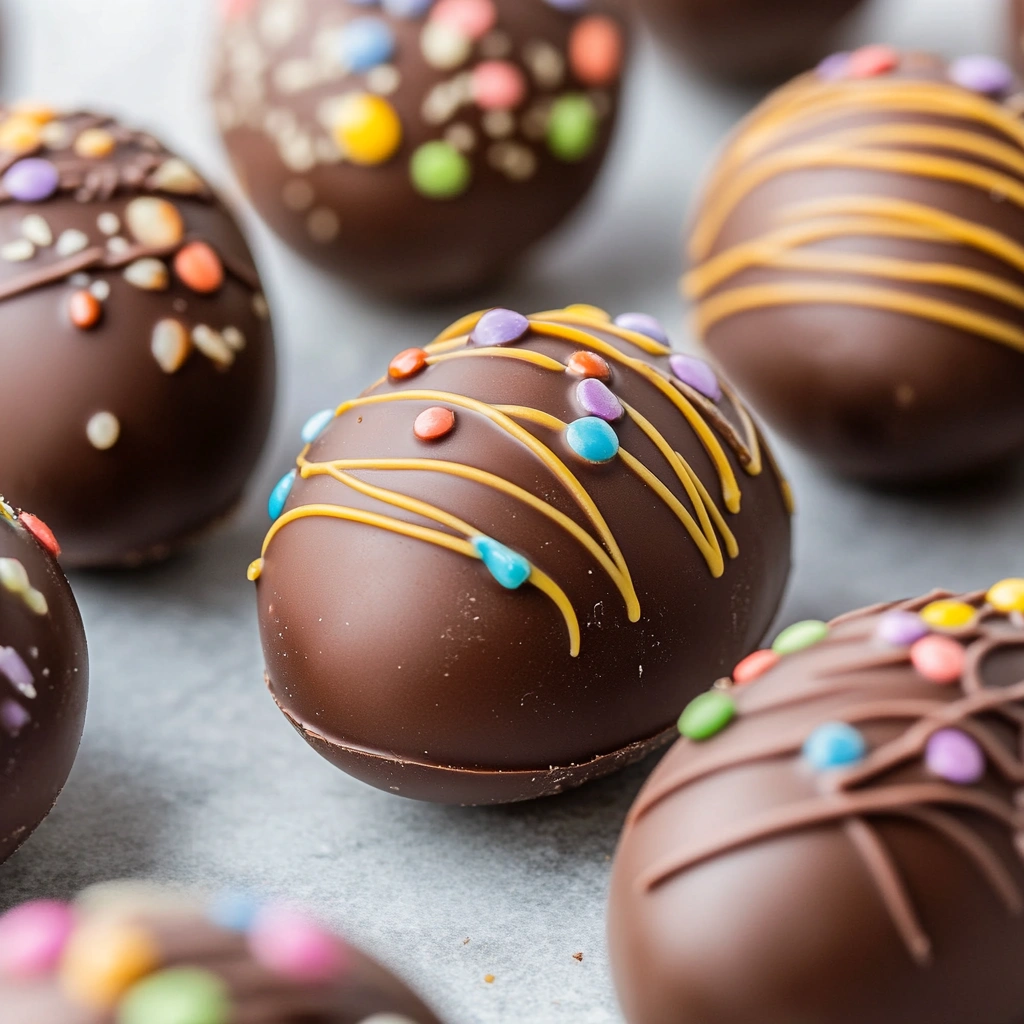
Kid-Friendly and Allergy-Safe Options
When it comes to Easter celebrations, kids are often the most excited participants—especially when chocolate is involved. But for parents dealing with allergies or dietary restrictions, traditional treats can be a source of stress. The good news? Vegan chocolate covered Easter eggs offer a delicious and safe solution for children with common food sensitivities.
Making Vegan Chocolate Eggs for Kids
Kids love sweet, creamy chocolate and colorful, fun shapes. Vegan chocolate covered Easter eggs not only deliver on taste but also bring peace of mind by skipping common allergens like dairy, eggs, and gelatin.
When making these treats at home, opt for silicone egg molds, which make shaping and releasing chocolate easy (and fun for little helpers). Use dairy-free, ethically sourced chocolate chips or bars labeled “vegan” to ensure no hidden animal ingredients sneak in.
For the fillings, think creamy and kid-approved:
- Sunflower seed butter (a nut-free alternative to peanut butter)
- Coconut cream mixed with maple syrup for a sweet, fluffy center
- Strawberry chia jam for a fruity surprise
- Date paste blended with cocoa for a naturally sweet chocolate filling
These fillings are naturally free of common allergens and can be adjusted to suit your child’s taste preferences.
Tips for School-Safe, Nut-Free Easter Treats
Many schools have strict policies against nuts, making it essential to double-check your ingredients. Fortunately, there are plenty of vegan chocolate covered Easter egg recipes that are entirely nut-free and safe for classroom celebrations.
Helpful tips for creating allergy-friendly Easter treats:
- Check all labels. Even if a chocolate is vegan, it may be processed in a facility that handles nuts or other allergens. Choose certified allergy-friendly brands when possible.
- Go seed-based. Sunflower or pumpkin seed butters are creamy and kid-approved alternatives to almond or peanut butter.
- Avoid soy if needed. If your child is sensitive to soy, look for soy-free chocolate made with coconut milk or rice milk bases.
- Use fun molds and wrappers. Making the treat visually exciting can go a long way in making healthy options feel like a special indulgence.
- Add natural colors. Use beet powder, turmeric, or spirulina to give your vegan chocolate eggs a festive, colorful twist—without artificial dyes.
For parents and caregivers looking for safe and inclusive sweets, vegan chocolate covered Easter eggs can be a joyful part of any Easter celebration. They’re not only allergy-conscious but also fun to make, share, and enjoy with children of all ages.
Kids love sweet, bite-sized treats like these Valentine’s Day cake pops—you can adapt them for any holiday, including Easter.
Storage and Shelf Life of Homemade Easter Eggs
Once you’ve gone through the effort of making beautiful, delicious vegan chocolate covered Easter eggs, it’s essential to store them properly to maintain freshness, texture, and flavor. Whether you’re prepping ahead for a big Easter celebration or making a large batch for gift-giving, understanding the best storage methods will help your treats last longer without compromising quality.
Best Practices for Keeping Them Fresh
Homemade vegan chocolate covered Easter eggs don’t contain preservatives like many store-bought candies, so proper storage is key. To keep your eggs fresh and smooth, store them in a cool, dry place away from direct sunlight.
If your eggs have a creamy filling—like coconut cream, nut butters, or date caramel—they should be stored in an airtight container. Place parchment paper between layers to prevent sticking. For optimal freshness, consume your homemade vegan chocolate covered Easter eggs within 5 to 7 days if kept at room temperature.
For longer shelf life, the refrigerator is your friend—but with some caveats. While it helps prevent spoilage, refrigeration can sometimes cause chocolate to develop a white coating, known as “bloom,” from sugar or fat separation. This doesn’t affect taste, but it may impact appearance.
Freezing and Refrigeration Tips
If you want to make your vegan chocolate covered Easter eggs well in advance, freezing is a great option. Wrap each egg individually in plastic wrap or parchment paper, then place them in an airtight freezer-safe container. This method prevents freezer burn and helps maintain flavor.
To thaw, remove the eggs from the freezer and let them sit in the refrigerator overnight. Avoid thawing at room temperature directly, as this can cause condensation, which may lead to soggy or sticky chocolate.
Quick tips for longer-lasting vegan chocolate covered Easter eggs:
- Store in a cool (65–70°F), dry place
- Use airtight containers to avoid moisture exposure
- Line containers with parchment paper between layers
- For creamy fillings, refrigerate for up to 10 days
- Freeze for up to 2 months, thaw gradually in the fridge
Properly stored vegan chocolate covered Easter eggs not only taste amazing for days but also make Easter more convenient and stress-free. Whether you’re planning ahead or saving leftovers, following these tips will ensure your treats are just as delicious as the day they were made.
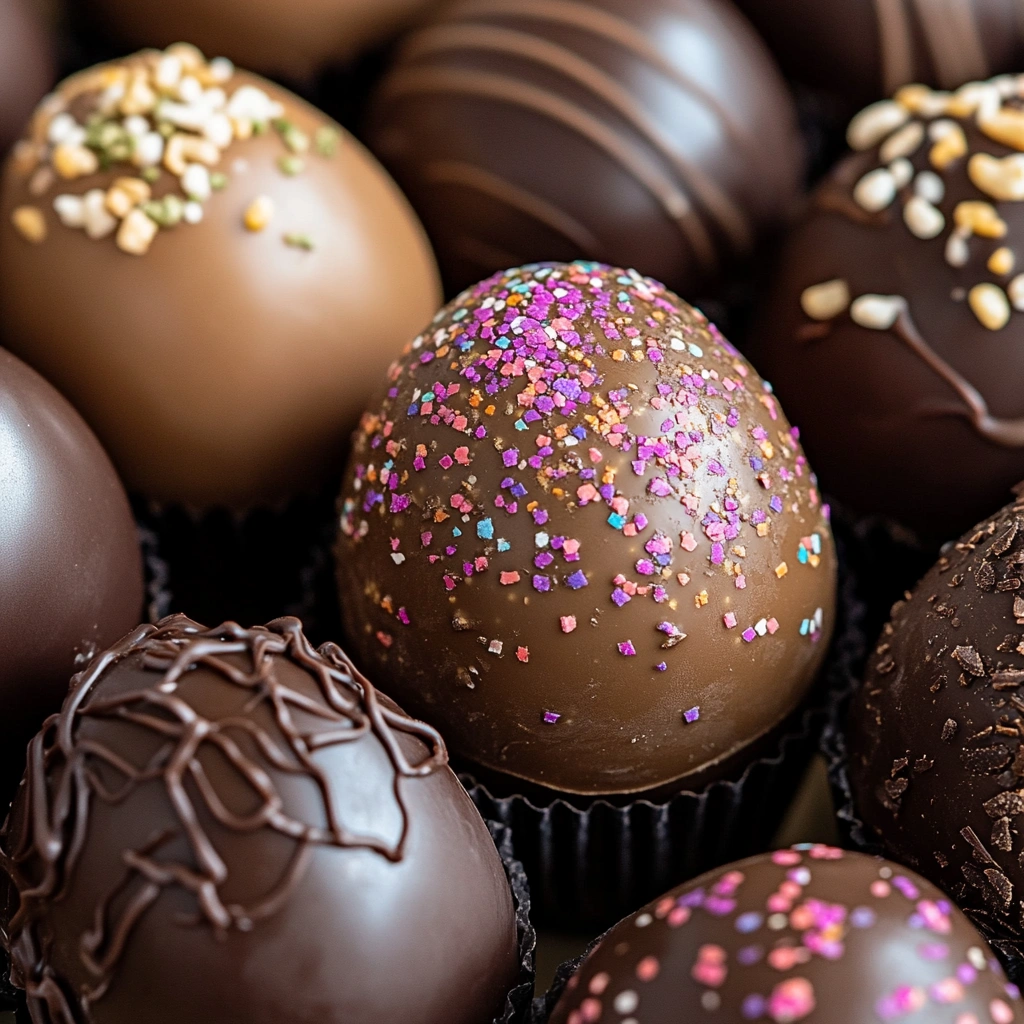
Eco-Friendly Packaging and Gift Ideas
As more people embrace sustainable living, eco-conscious gifting is becoming a major part of the holiday experience. If you’re creating or gifting vegan chocolate covered Easter eggs, using thoughtful, environmentally friendly packaging adds meaning to your efforts. It shows that your commitment to compassion extends beyond what’s on the inside—it’s also about how it’s presented.
Sustainable Wrapping for Vegan Easter Gifts
Packaging plays a huge role in how Easter gifts are perceived. Fortunately, it’s easy to make your vegan chocolate covered Easter eggs look beautiful without contributing to waste.
Consider these planet-friendly options:
- Recycled kraft paper boxes or egg cartons lined with parchment paper
- Reusable glass jars or tins for a charming, zero-waste gift presentation
- Compostable cellophane bags made from plant-based materials
- Fabric wraps (furoshiki-style) using organic cotton or linen cloth
- Seed paper tags that double as a gift label and a plantable surprise
These eco-friendly materials not only preserve the freshness of your vegan chocolate covered Easter eggs but also help cut down on plastic use during a holiday that’s traditionally known for excess packaging.
Creative Baskets and Presentation Hacks
Whether you’re putting together a child’s Easter basket or a gourmet chocolate gift set for a friend, presentation matters. Vegan treats can be every bit as festive and exciting as traditional ones—with a little creativity.
Try these ideas:
- Use upcycled baskets or reusable wooden crates as bases
- Shred old paper or use dried grass as a nest for your chocolate eggs
- Incorporate dye-free natural Easter grass made from cornstarch or recycled paper
- Add handwritten recipe cards for homemade vegan chocolate covered Easter eggs
- Include a few small toys or trinkets made from sustainable materials for younger recipients
With a focus on reusability and natural materials, you can turn any batch of vegan chocolate covered Easter eggs into a thoughtful, eco-luxurious gift.
Creating a beautiful presentation doesn’t require glittery cellophane or plastic eggs. When you align your packaging choices with the values behind your treats, you deliver a complete experience—one that celebrates both compassion and sustainability.
Frequently Asked Questions
Are vegan chocolate covered Easter eggs healthier than regular ones?
Vegan chocolate covered Easter eggs are often considered a healthier alternative to traditional eggs because they typically exclude dairy, refined additives, and preservatives. Many homemade versions also use natural sweeteners and clean ingredients, making them a better option for those seeking plant-based or minimally processed treats.
What chocolate brands are truly vegan for Easter?
Several brands now offer truly vegan chocolate suitable for making or gifting vegan chocolate covered Easter eggs. Some top options include Enjoy Life, Hu Kitchen, No Whey! Foods, and Endangered Species Chocolate. Always check labels to ensure they are free from dairy, whey, and other animal-derived ingredients.
Can you make vegan chocolate eggs without nuts?
Absolutely. You can make vegan chocolate covered Easter eggs without using any nuts by opting for nut-free fillings like sunflower seed butter, coconut cream, oat-based caramel, or date paste. These options are safe for school settings and individuals with nut allergies.
How long do homemade vegan Easter eggs last?
Homemade vegan chocolate covered Easter eggs can last up to one week at room temperature if stored in a cool, dry place. If refrigerated, they can stay fresh for 10 to 14 days. For longer storage, freezing is an option—frozen eggs can last up to two months when properly wrapped and sealed.
Are vegan chocolate Easter eggs kid-friendly?
Yes! Vegan chocolate covered Easter eggs are incredibly kid-friendly. You can use allergen-safe ingredients, natural colors, and fun shapes to make them exciting for children. Plus, they’re free from common allergens like dairy and eggs, making them a safer choice for classroom treats or family gatherings.
Where can I buy vegan Easter eggs online?
You can find a variety of vegan chocolate covered Easter eggs from online retailers like Thrive Market, Amazon, Vegan Essentials, and specialty chocolate makers’ websites. Look for ethical certifications like Fair Trade and vegan labels to ensure you’re buying a truly plant-based product.
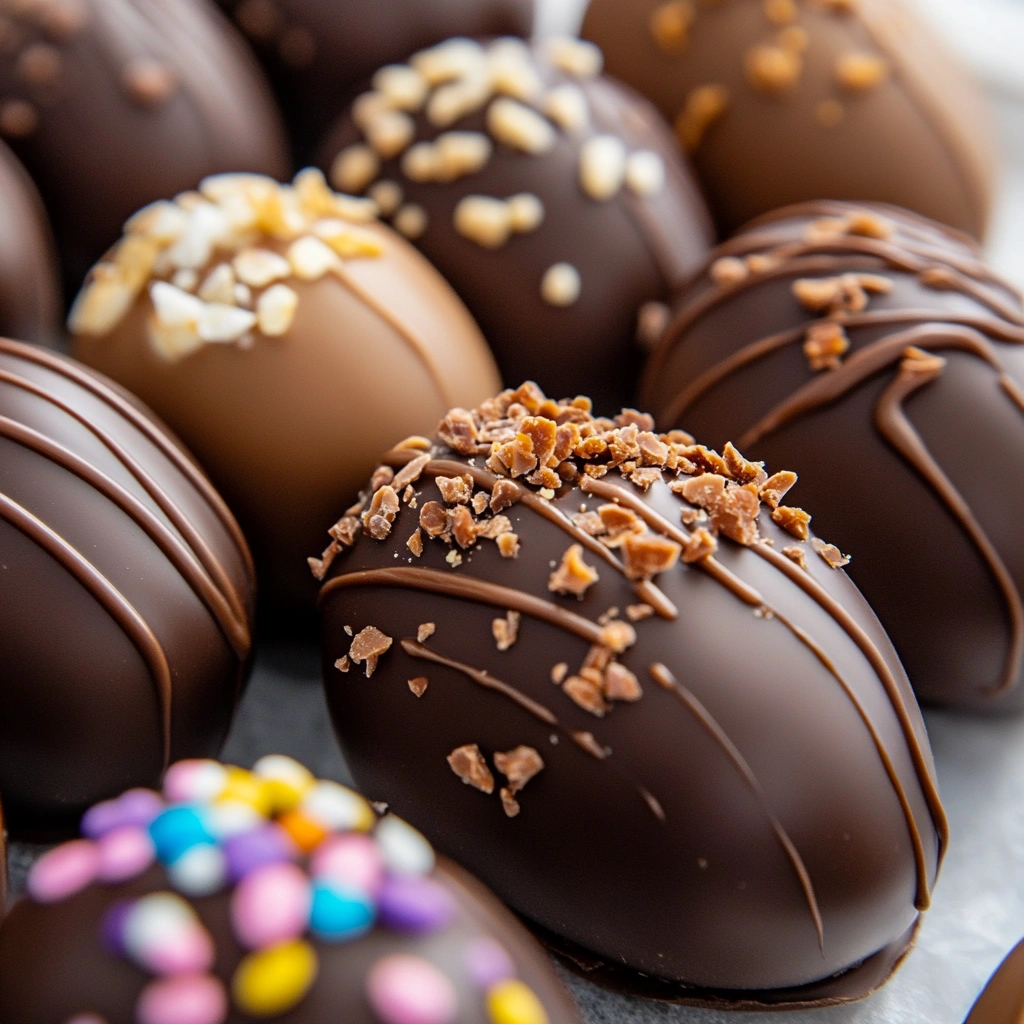
Conclusion: Celebrate with Joy – and Chocolate – the Vegan Way
Easter is a time for joy, renewal, and of course, sweet treats. With the growing availability of plant-based ingredients and creative recipes, vegan chocolate covered Easter eggs have become the go-to choice for anyone looking to celebrate with compassion and deliciousness.
From ethical sourcing to allergy-friendly alternatives, these dairy-free delights are more than just a trend—they represent a thoughtful shift in how we enjoy holidays. Whether you’re making them at home with creamy fillings, gifting beautifully wrapped boxes of store-bought treats, or exploring new flavors and toppings, there’s no shortage of ways to enjoy vegan chocolate covered Easter eggs this season.
They’re kinder to animals, better for the planet, and every bit as indulgent as their traditional counterparts. Plus, with so many allergen-conscious and kid-approved options, no one has to miss out on the Easter magic.
So this year, skip the conventional candy aisle and dive into a world of flavor, creativity, and compassion with your own batch of vegan chocolate covered Easter eggs. Your taste buds—and the planet—will thank you.
